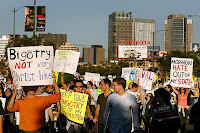 It’s been some time since I’ve blogged on faith-based issues. Since November I’ve been reading quite a bit about the fallout after the passage of Proposition 8 in California to ban same sex marriage. With Valentine’s Day approaching, I thought the same sex marriage controversy would make a good topic for the week.
It’s been some time since I’ve blogged on faith-based issues. Since November I’ve been reading quite a bit about the fallout after the passage of Proposition 8 in California to ban same sex marriage. With Valentine’s Day approaching, I thought the same sex marriage controversy would make a good topic for the week.
LGBT people across the USA reacted strongly and quickly to the Prop 8 passage with protests and angry words directed primarily at two targets: the Mormon Church and black people. There is a fine line between acceptable public outcry and intolerant rhetoric. I hate to brand one group of people intolerant due to actions of a few but I believe LGBT people need to work on practicing what they preach in terms of tolerance.
The Mormon Church’s did indeed vigorously support Proposition 8 and encourage its members to contribute and work to the cause. I don’t find this any surprise. The LDS have long been a very conservative religious sect that has very little tolerance for LGBT issues. Although non-violent, non-invasive protests at Mormon temples and churches are to many an acceptable form of activism I do not believe that houses of worship are acceptable targets for any demonstration. Threats, harassment, vandalism and invasion of worship services are not acceptable. The latter do indeed demonstrate a lack of tolerance by demonstrators. I can never see the Mormon church and their devout followers ever changing their mind on this issue. These demonstrations become front page and paint LGBT people as intolerant in many Christians’ eyes.
The reports of black people’s intolerance are also misplaced. If you analyze the vote outcome, you see that the issue passed by a 52% to 48% margin. Exit polls show that black voters supported the issue by a 58% to 42% margin; just slightly higher than the general California population. This disappointed many LGBT activists who could not understand why black people would not stand with LGBT people. I believe these results are also deeply rooted in religion and culture. The majority of black people attend non-denominational, Baptist or other fundamentalist churches. As with the Mormons, these are Christians whose faith will never support same gender marriage.
The theme that echoes through both the Mormon and black population is that principles of their faith have a big influence on how they vote on same sex marriage, as well as other social issues. Both groups would label themselves as tolerant of LGBT people. It is the “love the sinner, hate the sin” mentality. I’ll discuss this in a post later this week. Also in these two social groups and others, there is no distinction between civil and secular marriage. The line has been blurred for them. There is the feeling that to allow civil marriage would be to surrender their principles and the teachings of the Bible. It’s simple: civil marriage = secular marriage.
LGBT people need to be tolerant of people who possess differing opinions on this matter. However, this tolerance should not deter them from seeking equal treatment and their civil rights. Violence, vandalism and desecrating religious space are not acceptable forms of protest. LGBT people lose big time if they preach intolerance in their actions. Much can be learned from the peaceful actions of the Civil Rights Movement.

This is a very reasonable article. I commend you for it. As a Mormon, I can tell you that it is not a matter of intolerance of LGBT’s. It is merely a philosophical difference. Remember, you are dealing with a group that was denied the right to practice polygamy in the 1800’s. Mormons have a history of being persecuted. But I don’t think you will find Mormons persecuting LGBT’s, or anyone else. They may not wish to deal with them, they may not know how to discuss the issue with them, but it is a matter of conscience. I don’t believe you can compare blacks with gay’s. One is a matter of “being.” Although you might say the other (LGBT’s) is a matter of a behavior. You may argue that it is unchangeable. And that may be true in some cases. But it is nevertheless a matter of a specific behavior, not a characteristic that is separately identifiable from behavior.